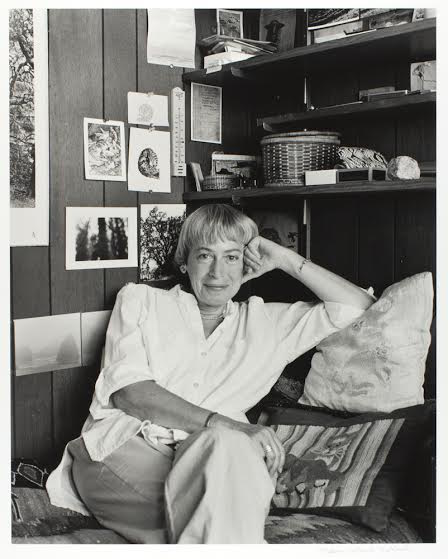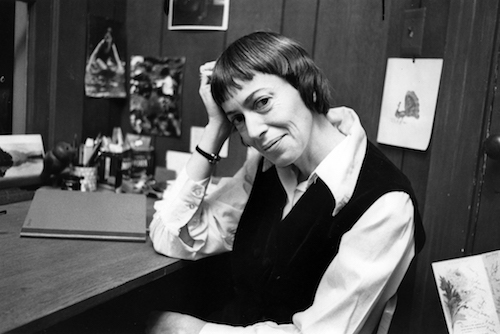Communiqué
“Worlds of Ursula K. Le Guin” on AMERICAN MASTERS, Friday August 2 at 9 pm
< < Back to worlds-of-ursula-k-le-guin-on-american-masters-friday-august-2-at-9-pmAmerican Masters Presents the Exclusive U.S. Broadcast Premiere of Worlds of Ursula K. Le Guin, the First Documentary on the Renowned Writer, August 2 on PBS
Features intimate conversations with the author, and new interviews with Neil Gaiman, Margaret Atwood, Michael Chabon and David Mitchell
This year marks the 50th anniversary of Le Guin’s seminal novel “The Left Hand of Darkness”
Best known for her science fiction and “Earthsea” fantasy series, celebrated and beloved author Ursula Kroeber Le Guin (1929–2018) wrote 21 novels, 11 volumes of short stories, four collections of essays, 12 children’s books, six volumes of poetry and four of translation during her life. American Masters presents the first documentary film exploring the remarkable life and legacy of the prolific and versatile author: Worlds of Ursula K. Le Guin, premiering nationwide Friday, August 2 at 9 p.m. on WOUB, pbs.org/americanmasters and the PBS Video app.

Produced with Le Guin’s participation over the course of a decade, American Masters – Worlds of Ursula K. Le Guin tells the intimate coming-of-age story of the Portland, Oregon, housewife and mother of three who forever transformed American literature by bringing science fiction into the literary mainstream. Through her influential work, Le Guin opened doors for generations of younger writers like Neil Gaiman, Margaret Atwood, Michael Chabon and David Mitchell — all of whom appear in the film — to explore fantastic elements in their writing.
The film explores the personal and professional life of the notoriously private author through revealing conversations with Le Guin as well as her family, friends and the generations of renowned writers she influenced. Visually rich, Worlds of Ursula K. Le Guin illustrates the dramatic real-world settings that shaped Le Guin’s invented places using lush original animations over her own readings of her work to provide a firsthand experience of her fantastic worlds.
American Masters – Worlds of Ursula K. Le Guin begins with Le Guin’s early struggle to get published in the overwhelmingly male and realism-dominated climate of the early 1960s. Her first major breakthrough came with the young adult novel “A Wizard of Earthsea,” set in a magical archipelago inhabited by wizards and dragons. Along with groundbreaking novels like “The Left Hand of Darkness” and “The Dispossessed,” “Earthsea” crowned Le Guin as the queen of science fiction by the end of the decade. But as a woman and a genre writer, she still faced marginalization that hobbled her career until the last decade of her life, when she won the National Book Foundation’s lifetime achievement award and became the second living author to have their work anthologized by the Library of Congress.

The film dives into Le Guin’s childhood, steeped in the myths and stories of Native Americans she heard growing up in Berkeley, California, as the daughter of prominent 19th century anthropologist Alfred Kroeber and writer Theodora Kroeber, author of the influential book “Ishi in Two Worlds.” This deep childhood understanding of cultural relativism infused her work with a unique perspective; her otherworldly societies are all in some way reflections of our own.
At the heart of the film is Le Guin’s intimate journey of self-discovery as she comes into her own as a major feminist author. “What I was doing was being a woman pretending to think like a man,” she says, reflecting on why her early novels put men at the center of the action. But as second-wave feminism crashed into the science fiction world in the 1970s, Le Guin recognized her own internalized notions about heroism and power. Initially defensive, she found truth in the criticisms of her work. When revisiting the realm of “Earthsea,” she turned her gaze to its women, instead of powerful male wizards. The result was a transformation that echoed throughout the rest of her oeuvre. By embracing her own identity and learning to write as a woman, she eventually rose to the height of her literary power. Working across many genres, Le Guin received numerous honors, including the National Book Award, Hugo Award, Nebula Award, PEN-Malamud, and she was voted into the American Academy of Arts and Letters.
Worlds of Ursula K. Le Guin had its world premiere at the Sheffield Documentary Festival and has shown internationally at dozens of festivals, garnering numerous awards.

